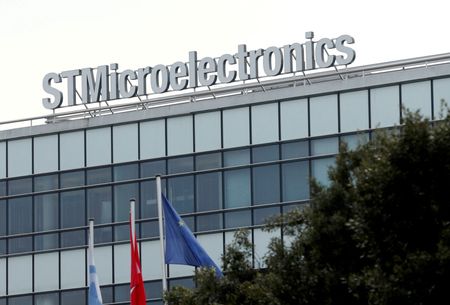By Stephen Nellis
(Reuters) – European chipmaker STMicroelectronics and chip design software maker Synopsys on Tuesday said STMicro had for the first time used artificial intelligence software running on Microsoft Corp’s cloud to design a working chip.
The achievement would help solve the growing problem of getting increasingly complex designs ready for customers in an acceptable time, STMicro said.
The company is one of a several that are using AI to help design chips, which involves translating a complicated circuit architecture into a blueprint for fabricating billions of transistors on a small piece of silicon.
Synopsys, the maker of the AI software used by STMicro, said on Tuesday it had now been used to aide in designing 100 different chips from Samsung Electronics Co Ltd, SK Hynix and others since it was first released in 2020.
The exact placement of the billions of transistors on a chip makes a big difference in its eventual performance. Engineers use software such as Synopsys’s to figure out where to put them, running several rounds of experiments with several possible designs to find the best one.
The problem in recent years is that chips have become far, far more complex, which means that finding the right design takes more and more experiments. But business deadlines have not gotten any longer: customers still want a steady drumbeat of new chips year after year.
To meet those deadlines, the AI system’s job is to help engineers weed out all the design experiments that will not lead to success and point to those that will.
“We have a limited amount of time,” said Indavong Vongsavady, who oversees design tools for one of STMicro’s groups. “Limiting to a practical number the size of experiments that we run – that’s the real point.”
Cloud computing also helps ease the time crunch. Shankar Krishnamoorthy, general manager of the design automation group at Synopsys, said that company’s AI engine got better results faster when it had more computing power behind it. Cloud providers like Microsoft offer the option to rent a huge burst of computing power in a short time.
“In most engineering environments, people say, ‘This is how much compute (power) I have. This is the time in which I need the results. Give me the best result,'” Krishnamoorthy said.
(Reporting by Stephen Nellis in San Francisco; Editing by Bradley Perrett)

